Posted by
Shay Harel
On August 22nd I presented you with a timeline of changes Google made to Keyword Planner’s search results. At the time, Keyword Planner has shifted to showing many users search volume ranges, as opposed to specific search volume numbers. Today we can add a new change to that timeline in what I would consider to be an even bigger adjustment to Keyword Planner that has set a new precedent. The Rank Ranger team has discovered that Google’s keyword research tool is now altering search queries, presenting results that don’t exactly match the initial phrase. As a result, Keyword Planner is at times showing results that not only don’t match the query exactly, but seriously deviate from the possible intent behind it.
Small Keyword Planner Result Changes Can Make a Big Difference
One of the first keyword searches we caught displaying results for a different search term related to car dealerships. We found that often enough Keyword Planner would show the results for the term “dealers”, instead of the the original search term “dealership.”
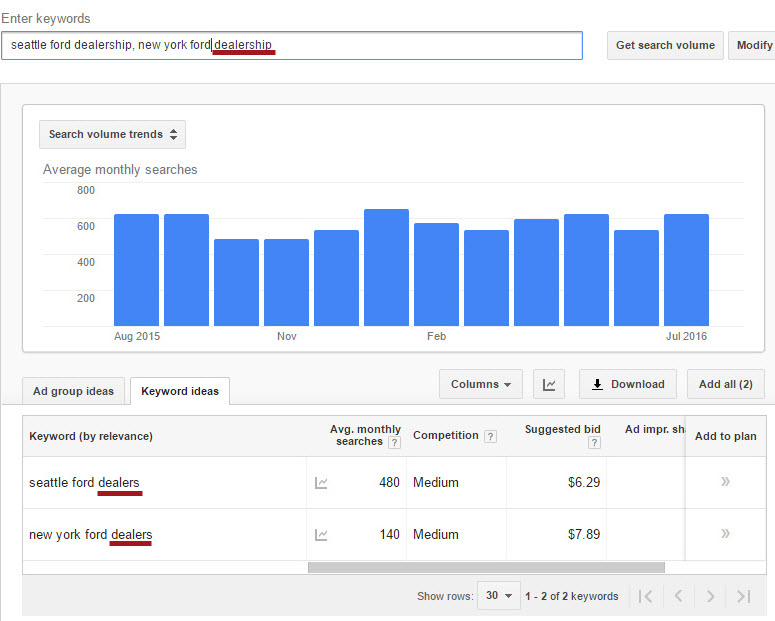
Keyword Planner substitutes the keyword “dealers” instead of the original search term “dealership”
In the above case, “seattle ford dealership” and “new york ford dealership” returned results that read “seattle ford dealers‘ and “new york ford dealers” respectively. While this may not seem like a major change that would have much impact, the truth is that a simple alteration like the one shown here can significantly affect the relevancy and meaning of a keyword search term.
In fact, having received this from our team, I decided to search for another auto maker, Mitsubishi. Why Mitsubishi? Well, because Mitsubishi is famous for selling a variety of products from TVs to air conditioning units. Here, the change from “dealership” to “dealers” is a significant change. The term “dealership” is generally reserved for car sales. That is, the term inherently connotes cars, whereas the term “dealer” could refer to a variety of industries. Google’s alteration was not cataclysmic in the first example because the Ford brand is naturally and primarily associated with the auto industry. Not so with Mitsubishi. When I did enter “Mitsubishi dealership” indeed Keyword Planner yet again altered the results to show “Mitsubishi dealers.”

Substituting the term “dealership” with “dealers” presents real implications when the auto brand is changed to Mitsubishi
However, as opposed to the search for “Ford” the meaning associated with “Mitsubishi dealer” does not connote the same meaning as its American auto-making counterpart. As such, the result Google has supplied me with may not align with my initial search and this little change does at the of the day make a big difference when carrying out keyword research.
Keyword Planner’s Altering of the Search Term Changes the Meaning
Keyword Planner showing keyword results that are not aligned with the original query term can result in the initial intent of the keyword term becoming lost, and its meaning changed. This is self-evidently significant and can make things a bit more complicated for users trying to find data related to their intended search term. By way of example I searched for the phrase “apartment rental” and Keyword Planner showed me “apartment rent.”
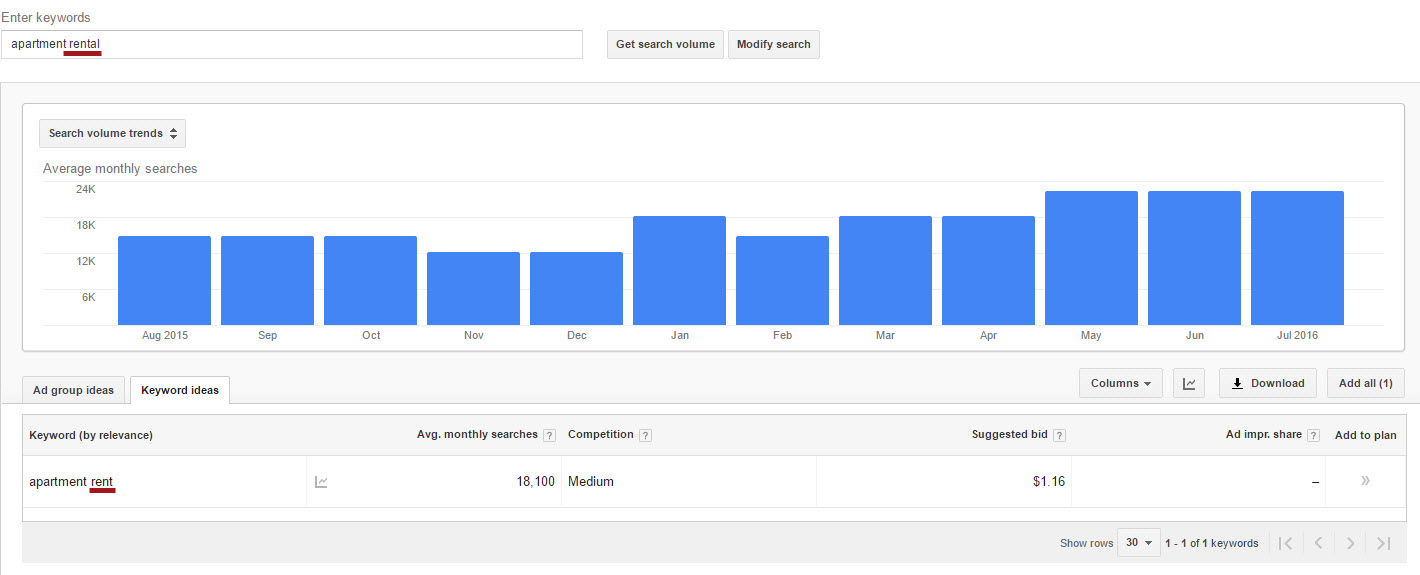
Keyword Planner changes the keyword query from “apartment rental” to “apartment rent” thereby changing the query’s original intention
Rent and a rental are clearly not the same thing. A rental refers to the entity that is the apartment itself and its status as a rental (as opposed to it being a condominium for example). In contradistinction, the term “apartment rent” refers to the payment a tenant living in an apartment is obligated to pay.
Keeping within the housing industry, take the keyword search phrase “contracting home.” My intent when entering the term related to the contracting stage of buying or selling a home.
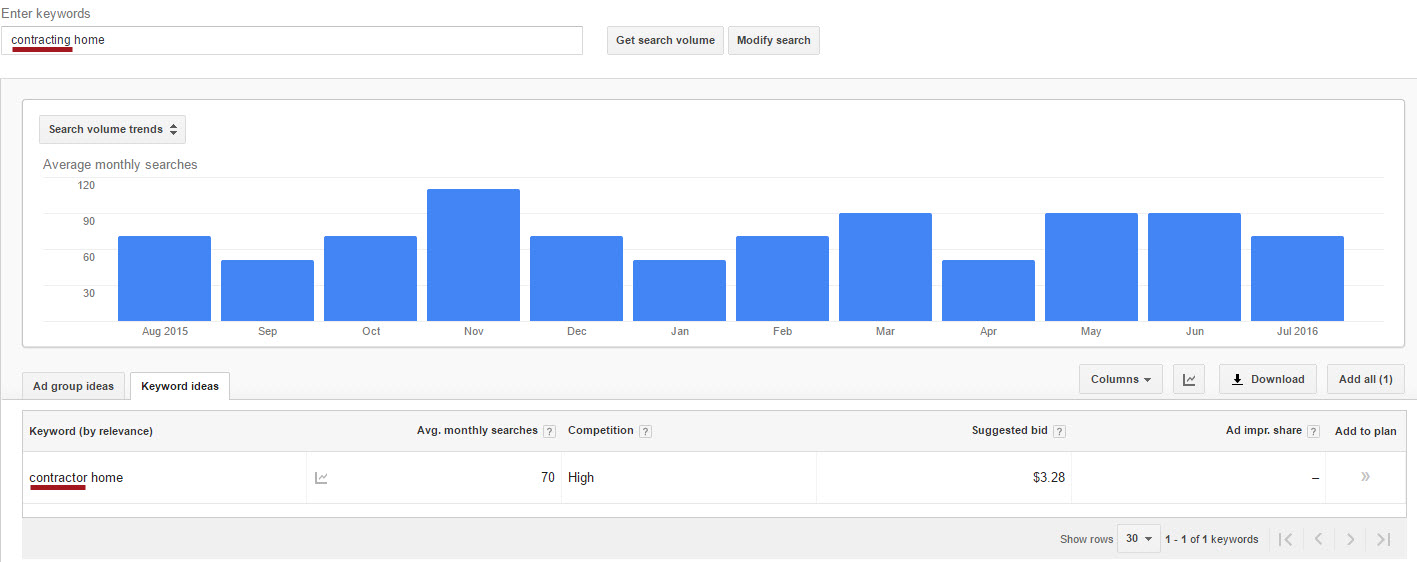
By changing the keyword phrase to “contractor home,” Keyword Planner has moved away from the subjective meaning presented in the original search term
Google however returned a result that related to home improvement, “contractor home.” Thus, the initial intent of my query has been lost and the term presented within the result is rendered meaningless as it does not align to the nature of my search at all. Simply, by altering the keyword term, I did not obtain the search volume for the keyword I was searching for.
Search Results on the SERP Do Not Align to Keyword Planner Phrase Alterations
As frustrating as I found the above examples I was simply baffled when I compared Keyword Planner’s search term alterations to actual results on the SERP. I theorized that if Google was altering and adjusting my search phrases that there would be some sort of continuity between the keyword research tool and the actual SERP results. In other words, if Google was interchanging terminology on its keyword research tool, it would only make sense that those terms would be interchangeable regarding the search results as well. If the keyword term Google morphed my initial query into is not synonymous with how search results on the SERP display, then why should Keyword Planner alter my keyword phrase to begin with?
As part of my tour through Google’s keyword phrase transformations I searched for the term “home decoration” and was supplied with the phrase “home decor” instead.
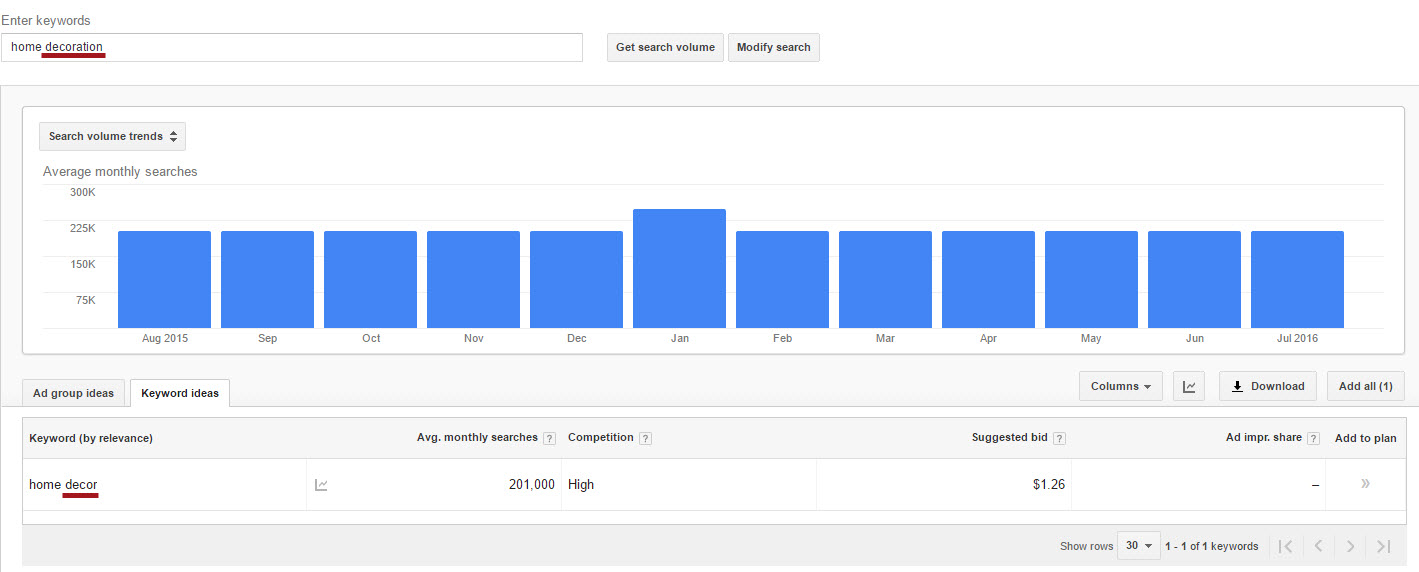
A change in keyword phraseology from “home decoration” to “home decor” obviously alters the meaning of the keyword
The obvious difference between the two terms is that “home decoration” refers to the act of decorating one’s home whereas “home decor,” is more a type of object, or a reference to the finished product of decorating one’s home. If I were to imagine a SERP that showed results for my original keyword I would expect to find tips about how to go about home decoration, perhaps a list of magazines that discuss the topic, etc., which is pretty much what I saw when I did a Google search for home decoration.
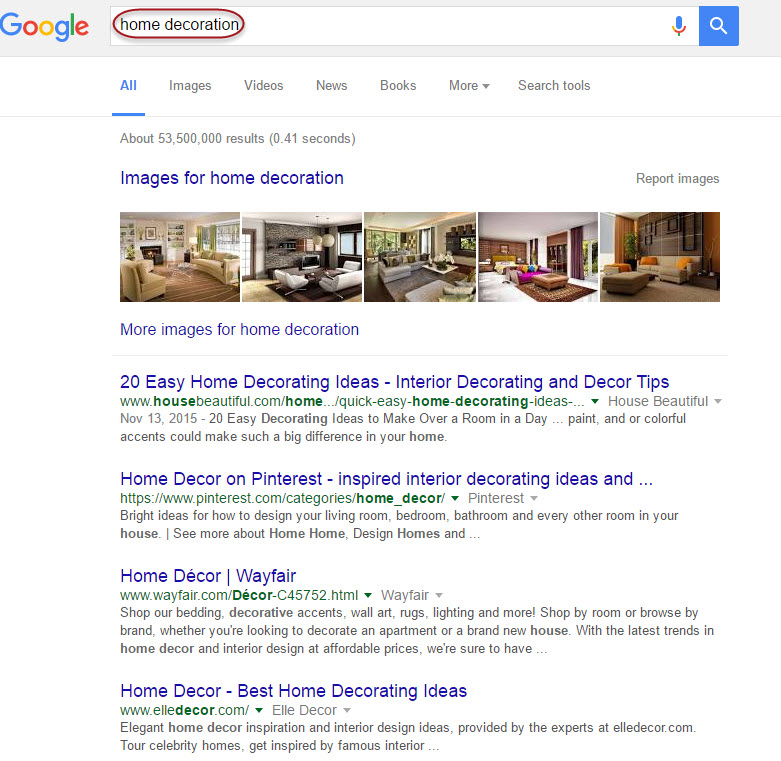
The Google SERP for the search query “home decoration” produces results that deal with how to decorate a home
Doing a Google search for “home decor” I also got what I expected to see, websites that offered products within the home decor category.
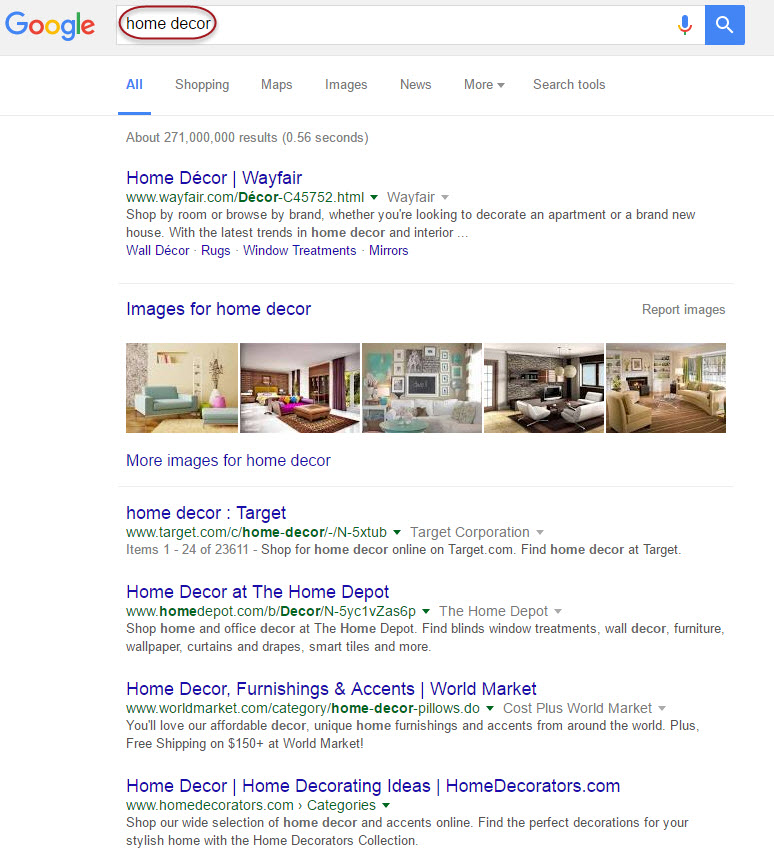
A search for “home decor” produces only one shared result with a search for “home decoration” and deal with home furnishings per se
So, if Google search knows the difference between the two terms, as evidenced by its two vastly different SERPs, why is it trying to throw an unwanted term on me within Keyword Planner?
Just to accentuate the point I did a search for the term “online banker,” banking on the fact Keyword Planner would show me results for the term “online banking.” Terrible puns aside, Google did exactly that, and Keyword Planner decided that I was not looking for an online banker, but was looking to do some online banking (why do I feel like Google is becoming my mother?).
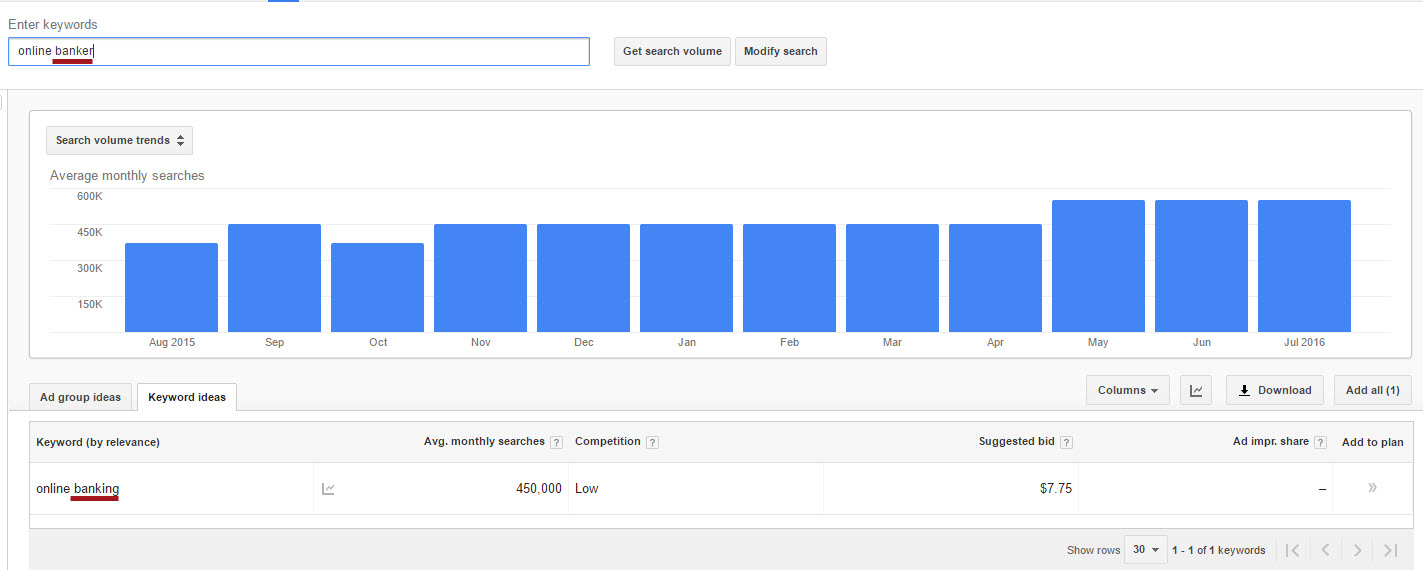
Keyword Planner alters a search for “online banker” and displays a result for “online banking”
Turns out that there is such a thing as an online banker, it’s the name of an online banking tool NBT Bank offers its customers. Suppose I wanted to name a tool “Online Banker” to compete with NBT, with Google showering me with the results it thinks I want, I’m left in the dark. I don’t mean to be sarcastic, but maybe I have a crazy idea for an online banking consulting firm, and I want to see if people are looking for the term “online banker,” wouldn’t seeing that there is no search volume at all be helpful to me? Why is Keyword Planner taking that away?
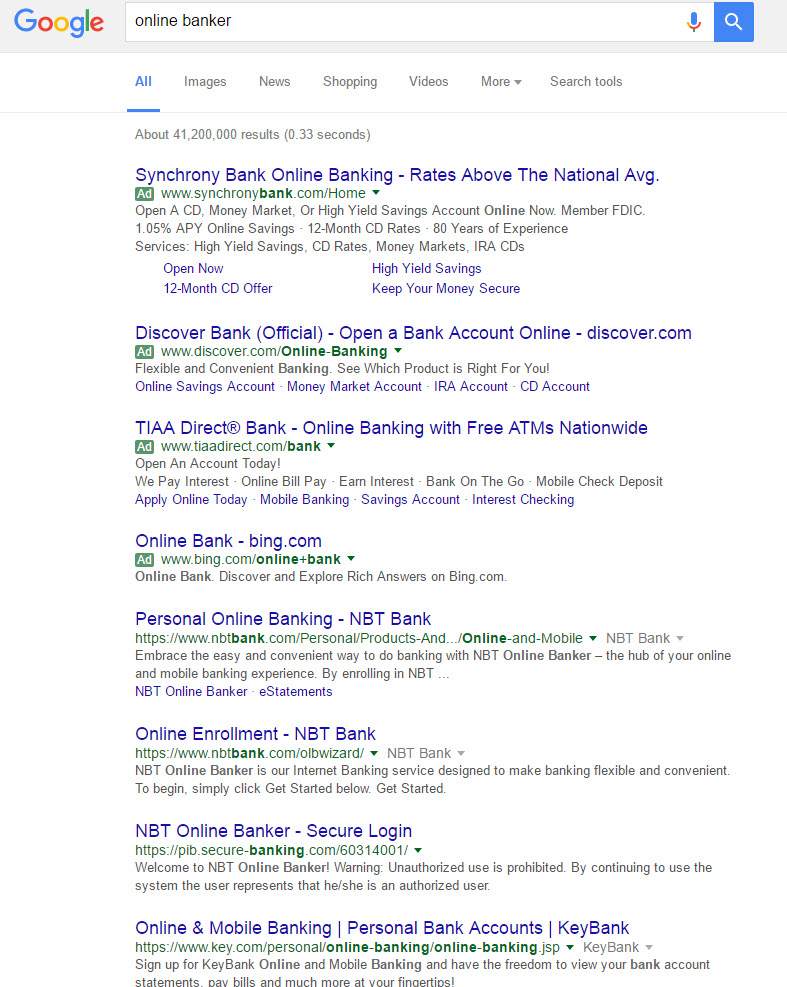
The search results page for “online banker” yields a result directly related to the keyword
Might I add that the SERP for “online banking” is very much different than the SERP for “online banker,” which means Google does see a difference between the terms and thus I’m again feeling bewildered as I just don’t understand where Google is going with all of this.
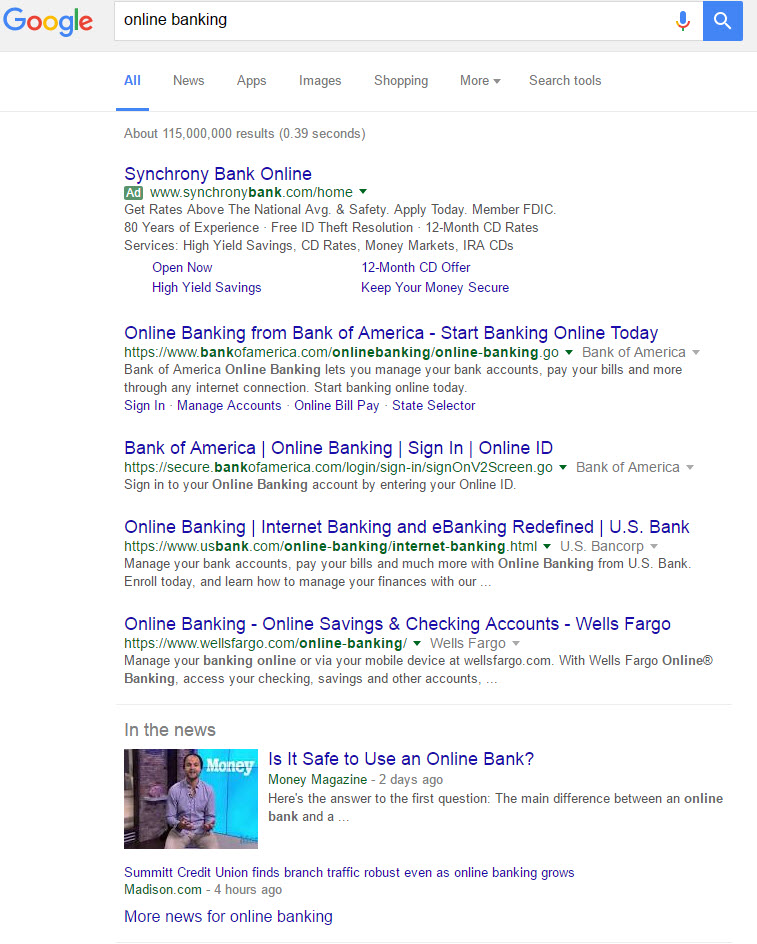
Search results for “online banking” do not present results related to “online banker”
Keyword Bucket Disorientation
Keyword Planner’s new term swapping presents another problem. As is well known, Google had begun to categorize similar keywords together by search volume, showing each synonymous keyword with the same volume, though listing each keyword independently. Now, as Keyword Planner swaps your original keyword term with another (which as an aside, is often not very synonymous, see above), how do you know which “bucket” your keyword falls into?
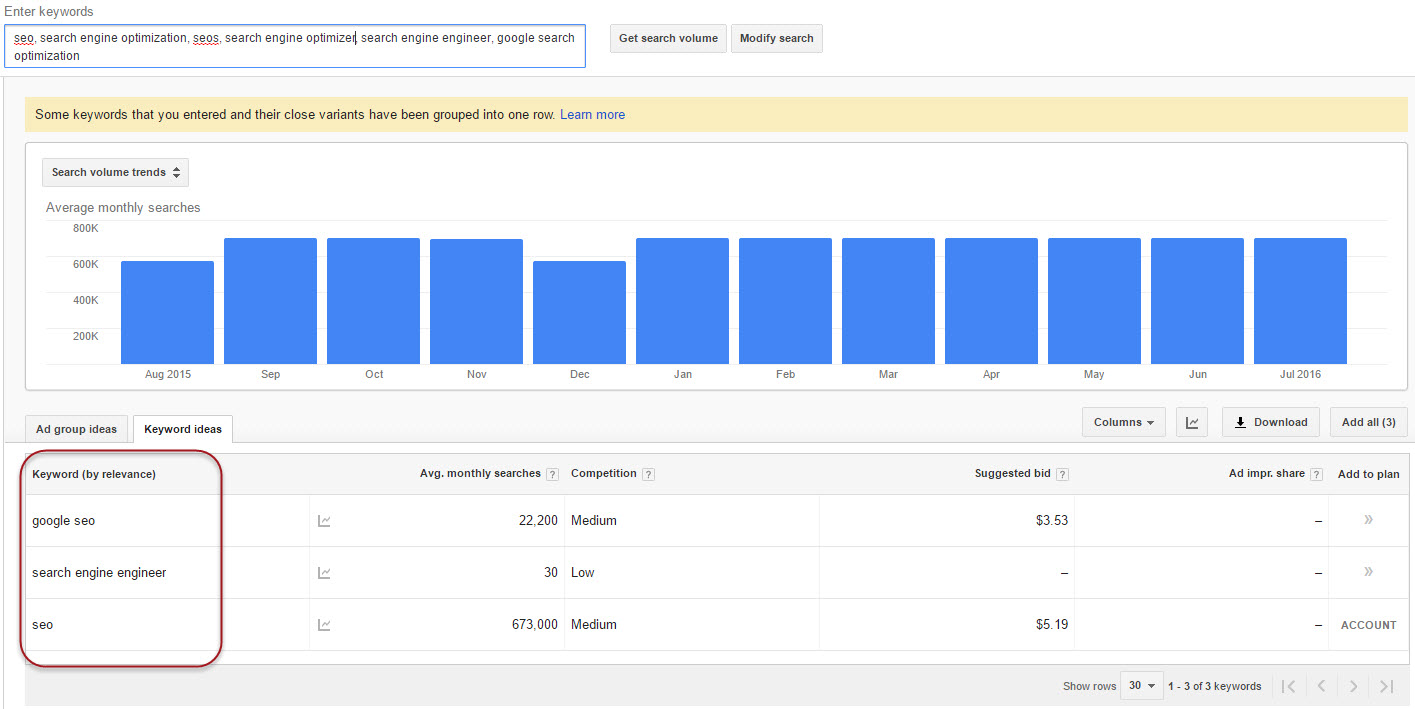
As Keyword Planner shows variant terms in results, deciphering a multi-keyword search becomes more difficult
Using the above image as an example, it’s entirely possible that “search engine optimizer” falls under the search engine engineer “bucket.” It’s also equally possible that it’s a part of the seo bucket. Outside of searching for each keyword separately, how are you to know? Does this in turn make searching for a mass of keywords at once obsolete?
Why Is Keyword Planner Taking My Keyword Phrase Choice Away?
The real question is: Why is Google doing this? I understand that Google may want to offer suggestions in the SERP for related searches that perhaps I didn’t think of, that are perhaps more on target. That’s all fine and good, but why does Google think, I don’t know what I want and what I’m talking about (again, I’ll just ask, does Google know mother, because this is getting freakishly too similar). All-in-all I found this user experience very frustrating. At a certain point, I just couldn’t get Google to give me the keyword information that I wanted. I for one want to know if my keyword choice is stupid, off target, and irrelevant, but when Google decides to take the words out of my mouth, ultimately I’m left not getting what I came to Google for.

Worst off all, Google is often supplying me with alterations to my search that misrepresent my intent, leaving my keyword research off-kilter. So, I’ll ask it again, why? Because it truly makes very little sense to me. It almost feels like I’ve been “RankBrained.” Is this Google testing out RankBrain in some backhanded way? If so, the results I got ironically took me further away from my true intent. Bottom line, I’m left feeling dazed and confused by the recent adjustment to Keyword Planner, how about you?

